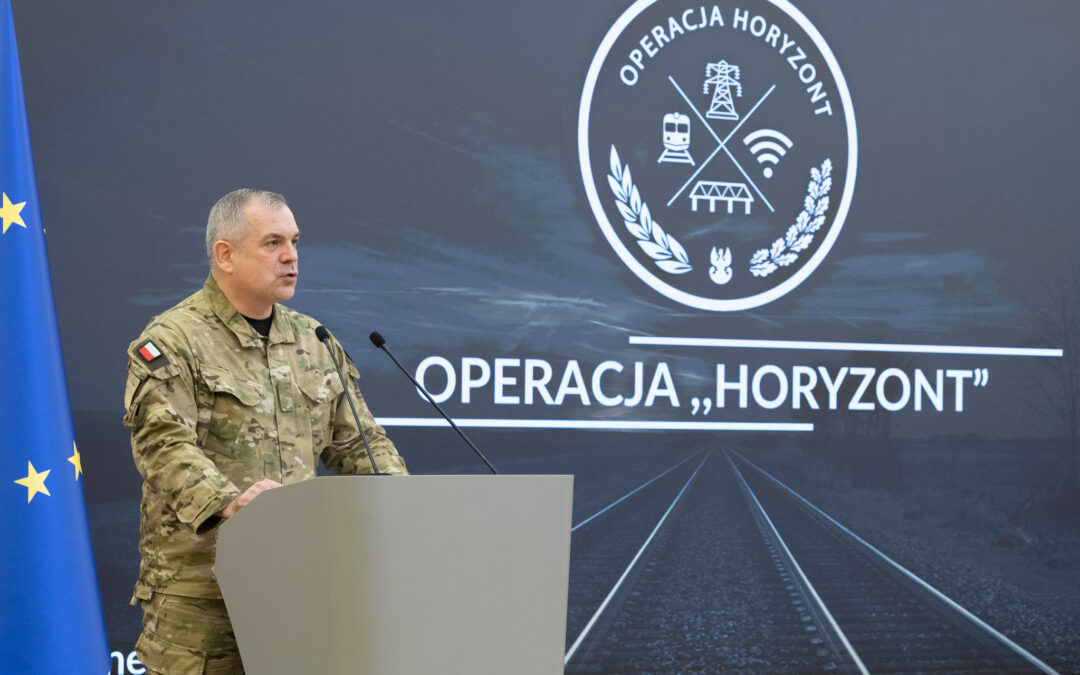Keep our news free from ads and paywalls by making a donation to support our work!

Notes from Poland is run by a small editorial team and is published by an independent, non-profit foundation that is funded through donations from our readers. We cannot do what we do without your support.
Poland’s government has announced a new military operation that will see up to 10,000 members of the armed forces deployed to secure critical infrastructure.
The move comes in the wake of last weekend’s explosion on a rail line, which Warsaw has blamed on Russia, and also following a longer campaign of sabotage in Poland and other European Union states orchestrated by Moscow.
As part of the new operation, the authorities will also encourage greater vigilance among the public, including through the launch of an application allowing people to report potential cases of sabotage.
10 000 żołnierzy w ramach operacji #Horyzont, będzie współpracować na terenie całej Polski ze służbami podległymi @MSWiA_GOV_PL, aby jeszcze skuteczniej chronić infrastrukturę krytyczną oraz zapobiegać atakom dywersji.
Wykorzystując zdolności wojsk operacyjnych oraz… pic.twitter.com/2H9wdqR4nR
— Władysław Kosiniak-Kamysz (@KosiniakKamysz) November 19, 2025
“The acts of sabotage that have occurred, including unprecedented cases of planting explosives intended to disrupt vital infrastructure, require intensified action and cooperation between the security services,” said defence minister Władysław Kosiniak-Kamysz, launching the new operation, codenamed Horizon, on Wednesday.
He spoke alongside interior minister Marcin Kierwiński and Wiesław Kukuła, the chief of the general staff of the armed forces, who emphasised that there would be “unified command and cooperation” between the different branches of the security services.
“Our goals will be to prevent acts of sabotage, limit the freedom of action of potential perpetrators, as well as to activate citizens, encouraging them to more closely observe their immediate surroundings and report situations that may raise concerns,” said General Kukuła.
To help with the latter aim, Kukuła revealed that an application for reporting potential sabotage incidents will be launched in late November or early December for testing, with a fully available version expected by mid-December, reports broadcaster Tok FM.
Kosiniak-Kamysz said that they hoped to begin the operation on Friday 21 November. However, a request to President Karol Nawrocki, who is commander-in-chief of the armed forces, first needs to be issued.
Nawrocki is aligned with the opposition and has regularly clashed with the government. However, the two sides have generally sought to present a united front on issues relating to national security.
But some of Nawrocki’s senior aides have been critical of the government’s response to the latest acts of sabotage, saying that they have politicised the issue.
They have also accused the authorities of reacting too slowly to initial reports of an explosion and of failing to give Nawrocki full and timely access to information.
Rządzący z D. Tuskiem na czele powinni przestać atakować Prezydenta K. Nawrockiego i pozwolić służbom na normalną współpracę z Głową Państwa. Bezpieczeństwo Polaków jest ważniejsze od ich partyjnych gierek! pic.twitter.com/nB78UqkV72
— Adam Andruszkiewicz (@Andruszkiewicz1) November 19, 2025
Meanwhile, prosecutors announced on Wednesday that they had decided to bring charges again the two prime suspects in last weekend’s rail-line sabotage, who they named for the first time as Oleksandr K. and Yevhenii I. (with surnames hidden under Polish privacy law).
Prosecutors want to charge the two men, who they have identified as Ukrainian, with carrying out acts of sabotage of a terrorist nature at the behest of Russia. They would face life imprisonment if convicted.
However, given that the pair were recorded crossing into Belarus, an ally of Russia, immediately after the sabotage took place, it appears unlikely that Poland will manage to secure their extradition.
Przemysław Nowak, spokesman for the prosecutors, confirmed on Wednesday that an unspecified number of other individuals have also been detained in relation to the latest sabotage incident but that no charges had for now been brought against them.
Two Ukrainians recruited by Russia carried out the acts of sabotage that damaged a train line in Poland, says Prime Minister @donaldtusk.
The pair then immediately fled to Belarus https://t.co/QPIRTDjQyP
— Notes from Poland 🇵🇱 (@notesfrompoland) November 18, 2025
On Wednesday, Polish Prime Minister Donald Tusk also spoke with Ukrainian President Volodymyr Zelensky about the latest sabotage incidents.
Afterwards, Tusk announced that the pair had agreed for their countries to cooperate more closely on identifying people suspected of working for Russia.
That follows questions being raised in Poland about how one of the suspected saboteurs managed to enter the country despite having previously been convicted in Ukraine of carrying out sabotage on behalf of Russia.
“Ukraine is ready to work with Poland at various levels and to share all information,” said Zelensky following his call with Tusk. “We agreed that we will set up a Ukrainian-Polish group that will work to prevent similar situations from the Russian side in the future.”
I spoke with the Prime Minister of Poland, @donaldtusk.
Prime Minister Tusk expressed his sympathy with regard to people killed in Ternopil and dozens wounded across other regions of Ukraine in Russian drone and missile attacks. Thank you for your solidarity, Donald. Repair…
— Volodymyr Zelenskyy / Володимир Зеленський (@ZelenskyyUa) November 19, 2025

Notes from Poland is run by a small editorial team and published by an independent, non-profit foundation that is funded through donations from our readers. We cannot do what we do without your support.
Main image credit: KPRM/Flickr (under CC BY-NC-ND 4.0)

Daniel Tilles is editor-in-chief of Notes from Poland. He has written on Polish affairs for a wide range of publications, including Foreign Policy, POLITICO Europe, EUobserver and Dziennik Gazeta Prawna.



















